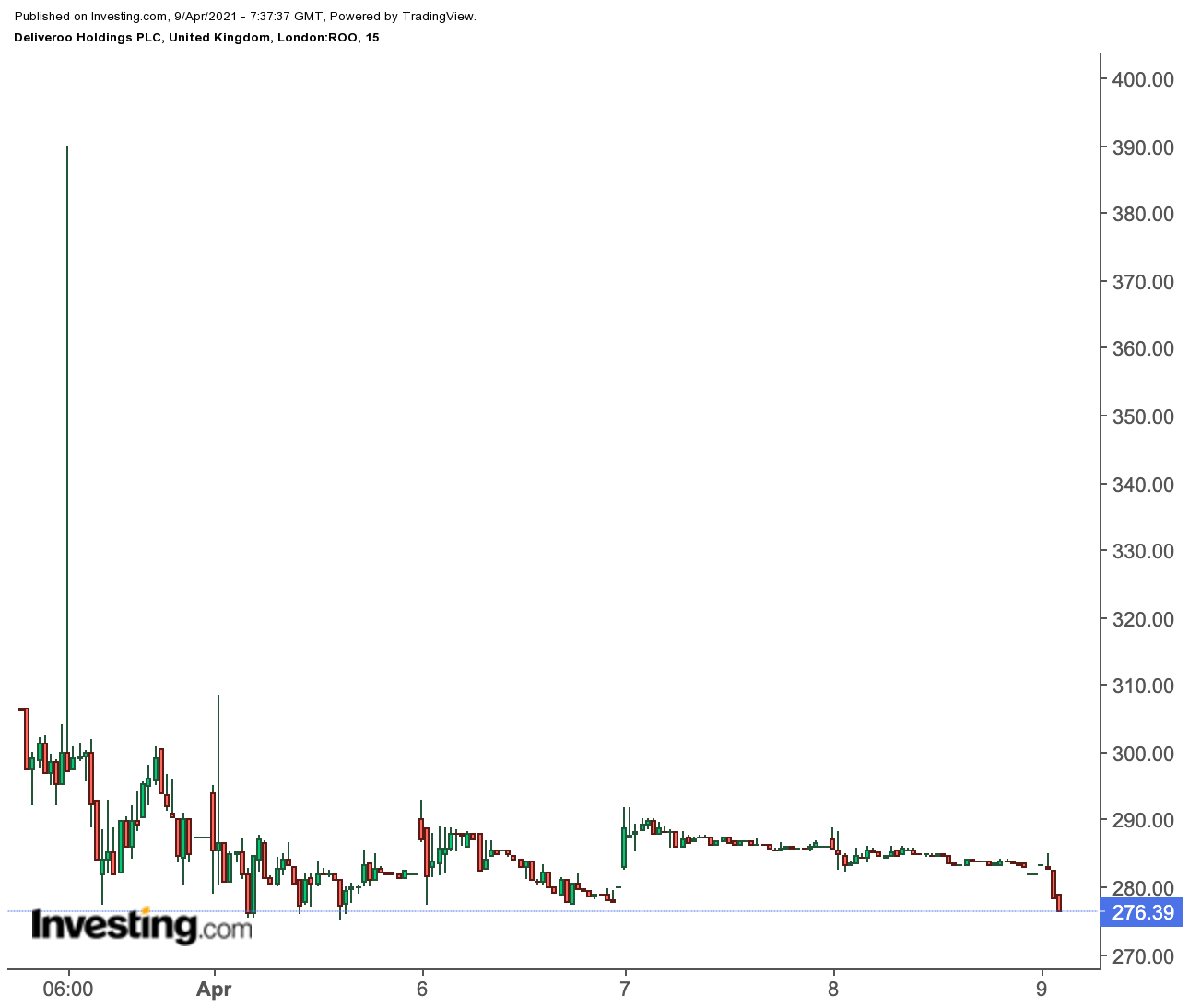Over the past several quarters, a large number of companies have gone public in the US. Many, such as Airbnb (NASDAQ:ABNB), Asana (NYSE:ASAN), DoorDash (NYSE:DASH), Jfrog (NASDAQ:FROG) and Snowflake (NYSE:SNOW), have chosen the traditional initial public offering (IPO) route.
Others, however, have completed reverse-mergers with special purpose acquisition companies (SPACs). Examples include Arrival (NASDAQ:ARVL), ChargePoint (NYSE:CHPT), DraftKings (NASDAQ:DKNG), Immunovant (NASDAQ:IMVT), Plby Group (NASDAQ:PLBY), Repay Holdings (NASDAQ:RPAY) and Virgin Galactic (NYSE:SPCE). On the other hand, Palantir Technologies (NYSE:PLTR) has chosen the direct listing (DPO) route.
But 2021 is shaping up to be a hot year for IPOs, especially in the UK. Today, we look at one company that had its IPO earlier this year: online food delivery company Deliveroo (LON:ROO).
No Tasty Returns Delivered Yet
Founded in London in 2013, Deliveroo, a well-known brand in the UK, had its IPO on Mar. 31. The excitement leading up to the the first day of trading was impressive. After all, ordering takeaway food has been the go-to activity during the pandemic lockdowns.
Recent metrics highlight that with around 25 million users, "the UK [is] responsible for approximately 40% of all European takeaway revenue." For instance, Just Eat Takeaway (LON:JETJ) (OTC:TKAYF), a FTSE 100 member, has seen significant revenue growth during the pandemic. JETJ shares are up over 16% over the past 12 months.
In August 2020, the UK Competition and Markets Authority (CMA) approved Amazon's (NASDAQ:AMZN) 16% ownership in Deliveroo, a development that clearly increased the hype surrounding the company’s IPO. In its analysis:
“The CMA ultimately found that this level of investment will not substantially lessen competition in either market. However, if Amazon were to acquire a greater level of control over Deliveroo—through, for example, acquiring a controlling interest in the company—this could trigger a further investigation by the CMA.”
Following the IPO, Deliveroo hit the headlines, but not for the right reasons. The company hoped the shares would sell around 390p (or about $5.35), at the bottom of the initially expected range of 390p to 460p. But on Mar. 31, the shares closed at 287p. Now, the stock trades around 282p ($4.15 for US-based shares).

The market capitalization currently stands at £5.2 billion (or $7.2 billion). In early 2021, Deliveroo’s debut was being hailed as potentially the largest IPO to be welcomed in London. Yet, it became the worst one in recent history.
Prior to this, in 2011, commodity group Glencore (LON:GLEN) (OTC:GLNCY) had been in the limelight as the largest public offering that became a disappointment. At the time, Glencore had faced controversies, particularly in environmental, social and governance (ESP) matters. Shares had also been priced on the lower end of their target. GLEN stock never reached its IPO price of 530p, hitting lows below 80p and currently hovering at 290p. Deliveroo would certainly hope this isn’t the case for ROO shares.
Concerns Over Pricing and Corporate Governance
In the past 10 days, analysts have been debating why this highly anticipated IPO was not well received. Many cite valuation levels as the main issue. Although Deliveroo had priced the shares at the bottom of the target range, it was still high for investors’ liking. As the UK gets ready to lift lockdowns and allow increased opening of non-essential businesses, takeaway ordering volumes could also start to decline.
Despite the growth in the online ordering market during the pandemic, the group is yet to make a profit in this competitive segment. In fact, prior to the approval of Amazon’s investment, in its dealing with the CMA, Deliveroo had argued, it could potentially be failing without Amazon’s backing. Not all fund managers have been impressed with the fundamentals of the loss-making delivery platform.
The other issue is its corporate governance, namely the working conditions for its riders. In February, the UK Supreme Court ruled that Uber (NYSE:UBER) drivers in the UK are workers and not independent contractors.
Given the judicial defeat for one of the biggest names of the gig economy, there's now the question of whether Deliveroo might have to improve pay and conditions for its delivery drivers. Management argued that this did not affect the group, but it seems like some investors thought otherwise. If Deliveroo’s costs were to increase due to higher driver costs, this would prolong the time before it would be profitable.
Finally, we should remind investors the dual class share structure in place. This arrangement gives the holders of a certain class of shares more voting rights than the holders of another class of shares. Such dual structure typically enshrines the power of a company’s founders. Indeed, after the IPO, Will Shu, Deliveroo’s founder, owns 6.3% of the company but holds 57.5% of the voting rights. This is a common practice in the US but not in the UK. As a result, Deliveroo was ineligible for inclusion in the FTSE 100.
Bottom Line
London is hoping to carve itself a niche status as the tech and innovation capital of Europe, and lure high-growth companies to list in the UK as opposed to the US
It is still early days in Deliveroo’s history as a public company. Investors could well be ready to put their faith in ROO stock when management has a clear path to profitability and corporate governance issues are better addressed.
